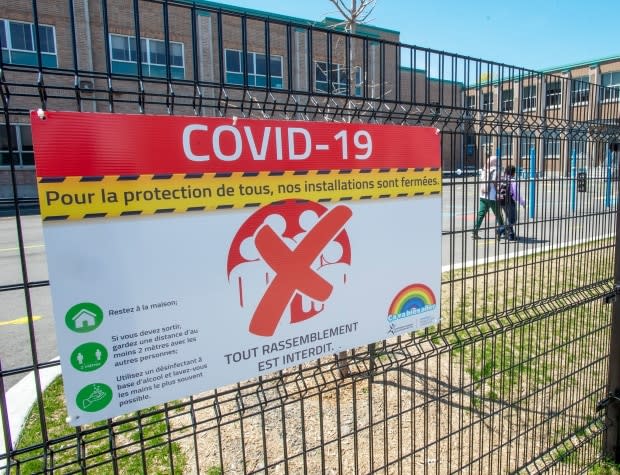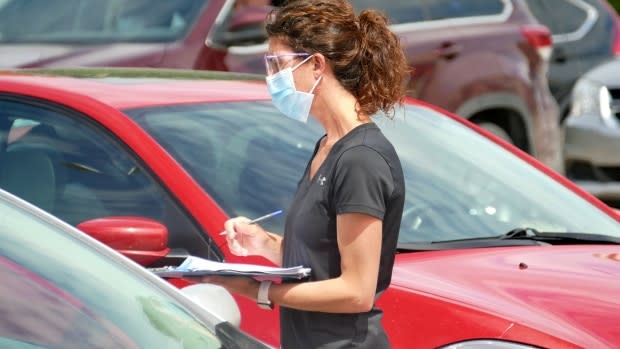What you need to know about COVID-19 in Ottawa on Friday, July 24

Recent developments:
You can now sign up for a smartphone app that warns users if they've been in close contact with someone who tests positive for COVID-19.
It's been one week since much of Ontario moved into Stage 3 reopening.
Ottawa is extending its swimming memberships another four-and-a-half months, plus giving swimmers two complimentary weeks. Pools reopened July 6.
If you're travelling to other parts of Ontario this weekend, seven more regions have moved into Stage 3, mostly around the Greater Toronto area, Hamilton and Niagara. Toronto, Peel Region and Windsor-Essex remain in Stage 2.
WATCH | Niagara Falls boats show differing approaches to physical distancing
What's the latest?
COVID ALERT, a smartphone tracing app is now being beta-tested. The technology works by having people who test positive upload their results anonymously to the app. Other people who also have the app and have been near the person who tested positive would get a notification alerting them that they've been exposed.
Much of Ontario, including Ottawa, moved into Stage 3 of the province's economic reopening plan. Cases have climbed since then, but health officials in Ottawa say they're not related to Stage 3 or even Stage 2, but people having large indoor gatherings. So if you want to hang out with friends who aren't in your social bubble, what can you do safely? CBC Ottawa spoke to a virologist to find out.
While eastern Ontario businesses have been gradually welcoming back customers for more than a month now, as COVID-19 restrictions gradually loosen, some proprietors in the National Capital Region have decided to remain closed.
The insolvency rate for both businesses and individuals has plummeted recently, but experts fear that bankruptcies will rise once COVID-19 related payment-deferral and financial aid plans come to an end.
WATCH | 'We're very nervous': Insolvency filings may spike after end of federal assistance programs
How many cases are there?
There have been 2,361 confirmed cases of COVID-19 in Ottawa since the pandemic began. The number of deaths remains at 263. The majority of cases in the city —1,883 — are classified as resolved.
Gatineau has reported a total of 559 cases.
In all, public health officials have reported more than 3,700 cases across eastern Ontario and western Quebec, and nearly 3,100 are resolved.
COVID-19 has killed 102 people in the region outside Ottawa: 52 in Leeds, Grenville and Lanark counties, 17 in other parts of eastern Ontario and 33 in the Outaouais.
The last coronavirus-related death in the region was June 25.
What's open and closed?
Ottawa is now in Stage 3 of Ontario's reopening plan, which means larger distanced gatherings and more activities allowed inside.
Quebec has similar rules, though people can be slightly closer in venues with seats and their social groups that don't have to distance inside can be from a maximum of three homes.
Up to 15 children can be at an Ontario daycare as of next week.
Quebec's back-to-school plans bring older students to classrooms again.
Ontario has put three options for next school year on the table, promising an update by early August, while post-secondary schools are moving toward more online classes in September.

Distancing and isolating
The coronavirus primarily spreads through droplets when an infected person coughs or sneezes. People don't need to have symptoms to be contagious.
That means physical distancing measures such as working from home, meeting others outdoors as much as possible and in Ontario, staying at least two metres away from anyone they don't live with or have in their circle.
Ottawa's medical officer of health said in mid-July people should be ready for COVID-19 social restrictions well into 2021 or 2022.
Masks are now mandatory in indoor public settings in all of eastern Ontario and Quebec.
WATCH | Doug Ford thanks Ontarians for containing coronavirus, compares numbers to U.S.
Anyone who has symptoms or travelled recently outside Canada must self-isolate for at least 14 days.
Specifically in Ottawa, anyone waiting for a COVID-19 test result must self-isolate at least until they know the result.
The same goes for anyone in Ontario who's been in contact with someone who's tested positive or is presumed to have COVID-19.
Ontario's Chief Medical Officer of Health strongly urges self-isolation for individuals who have weakened immune systems and Ottawa Public Health recommends people over 70 stay home as much as possible.
What are the symptoms of COVID-19?
COVID-19 can range from a cold-like illness to a severe lung infection, with common symptoms including fever, a dry cough, vomiting and the loss of taste or smell.
Less common symptoms include chills, headaches and pinkeye. The Ontario government says in rare cases, children can develop a rash.
If you have severe symptoms, call 911.
WATCH | French hospital testing new 'breathalyzer' to detect COVID-19
Where to get tested
In eastern Ontario:
In Ottawa any resident who feels they need a test, even if they are not showing symptoms, can now be tested at one of three sites.
Inuit in Ottawa can call the Akausivik Inuit Family Health Team at 613-740-0999 for service, including testing, in Inuktitut or English on weekdays.
Testing has also expanded for local residents and employees who work in the Eastern Ontario Health Unit area.
There is a drive-thru centre in Casselman that can handle 200 tests a day and assessment centres in Hawkesbury and Winchester that don't require people to call ahead.
Others in Alexandria, Rockland and Cornwall require an appointment.

In Kingston, the Leon's Centre is now hosting the city's test site. Find it at Gate 2.
Napanee's test centre is open daily for people who call for an appointment.
The Leeds, Grenville and Lanark unit asks you to get tested if you have a symptom or concerns about exposure.
It has a walk-in site in Brockville at the Memorial Centre and testing sites in Smiths Falls and Almonte which require an appointment.
The public health unit in the Belleville area is asking people to call it, their family doctor or Telehealth if they have symptoms or questions.
You can arrange a test in Bancroft, Belleville or Trenton by calling the centre and in Picton by texting or calling.
Renfrew County is providing pop-up testing in five communities this week and home testing under some circumstances.
Residents should call their family doctor and those without access to a family doctor can call 1-844-727-6404 to register for a test or if they have health questions, COVID-19-related or not.
In western Quebec:
Outaouais residents now can get a walk-in test in Gatineau five days a week at 135 blvd. Saint-Raymond and at recurring clinics in communities such as Maniwaki, Val-des-Monts and Fort-Coulonge.
They can call 1-877-644-4545 if they have other questions or to make an appointment.
First Nations:
Local communities have declared states of emergency, put in a curfew or both.
Akwesasne has had eight confirmed COVID-19 cases. Four of them are active and linked back to a gathering on an island with a non-resident who wasn't showing symptoms at the time.
It has a mobile COVID-19 test site available by appointment only and anyone returning to the community on the Canadian side of the international border who's been farther than 80 kilometres away is asked to self-isolate for 14 days. It's 100 miles or 160 kilometres away on the American side.
Anyone in Tyendinaga who's interested in a test can call 613-967-3603 to talk to a nurse. Face coverings are now mandatory in its public buildings.
People in Pikwakanagan can book an appointment for a COVID-19 test by calling 613-625-2259.
Kitigan Zibi is planning for an Aug. 29 election with changes depending on the status of the pandemic at that time. It plans on starting to open schools and daycares next month.
For more information


